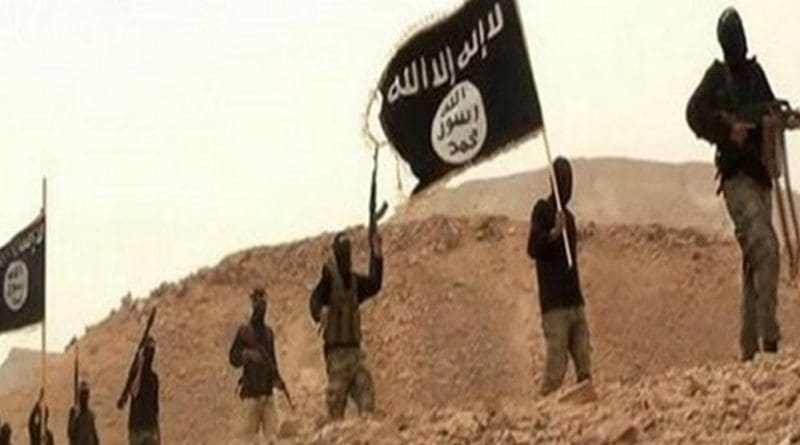Islamic State’s Deadly Essence Must Be Denied Chance To Thrive – Analysis
With Daesh declared defunct as an organized terrorist force in northeast Syria, the essence of the group’s use of extremist ideology has, in reality, left the Levant to spread more mayhem. We have seen Daesh affiliates begin to pop up from West Africa (Boko Haram) to Southeast Asia, specifically cells in Malaysia, Indonesia and the Philippines. Libya, Sinai and Yemen also stand out as other locations where Daesh adherents fled to from the Levant. These fighters are still active, so what is happening now is not the end of Daesh in the region per se, but the death of the original cancer after it had already spread to other parts of the body.
Daesh occupied the Levant like a cancer. It followed the traditional trade routes as it expanded, only to be beaten back into a corner and eradicated. This expansion and contraction model is and will be attempted again. Thus, the ideas of Daesh and its use of violent tactics to engrain itself in specific geographical areas is continuing.
Applying a human medical analogy helps illustrate Daesh and its capacity to spread its adherents out from its “caliphate” early in its existence. At its height, Daesh distributed fighters to key geographical areas, especially Libya and Southeast Asia via Malaysia. The ability to allot fighters early on in the so-called caliphate’s existence helped to spread the disease quickly, so that even if the original cancer cell is destroyed the movement’s essence lives on.
The fact that Daesh’s essence is based on hate, and a hatred of civilization in particular, is important. The way its cells transmit is to destabilize authority through violent acts, either as armed groups, small cells or lone wolves. Daesh’s use of the media is also notable, as it feeds on others who share such extremism. The point here is that the group’s essence seeks out crisis or tries to create crisis.
What is most important to understand about Daesh now is what happens to the other groups that pledged allegiance to it and its leader. With that central core gone, a key question needs to be asked: Does the absence of Daesh territory in the Levant mean anything to these affiliated groups? No, the end of Daesh in the northeast corner of Syria does not matter. These groups are more interested in building their own local networks and appealing to outcasts who live in their area. They too use local grievances to enter specific locations, while engaging in criminal acts to self-sustain and operate.
Meanwhile, there is a looming question about Daesh’s money. The fact that its Syrian branch still has hundreds of millions of dollars is a major factor in what happens next. Forensic work is necessary on how best to track down these assets. Smashing the physical territory of Daesh did not destroy its investments in the local economy, and there is reason to believe some assets may be as far away as Southeast Asia and Latin America.
Exactly how these accounts and holdings are going to support any future movement in the Levant is subject to events on the ground, where sustainability of effort will become key. The next wave of Daesh will reappear when the time is right, given that these investments can be made available. Considering the security environment in Syria and its environs, enforcement will be challenging and local responsibility may very well not exist in a manner conducive to stopping such behavior. If the opportunity to seize them does not arrive, these monies most certainly will be diverted to another project or projects.
Beyond that is where hawala, laundering and narcotics fit into the Daesh affiliates’ local landscapes on other continents, where they can establish their own illegal networks of commerce that fall outside of formal legal channels. One might argue that, wherever there is a location that meets the specific requirements to develop such a movement, the Daesh essence is likely to emerge. A key component that is required for Daesh, or any other extremist group, to take root or to act out is a hatred of civilization. Daesh’s essence in itself is hate.
Daesh’s mutation is likely given that any such affiliate is based on local issues and the direction of these groups is not organized in any meaningful matter. This aspect of the extremist movement — the space occupied by Daesh — remains potent and dangerous. It is not limited to specific corners of the earth but is everywhere, except formally in Latin America. This continent may be the next frontier.
Overall, the affiliates and their adherents are fighting on the ground that they currently occupy and attempting to build their power and spread their influence locally. Adherents look for other countries that suffer daily and where hatred, which can take many forms such as through violence, voice or cyberspace, can take root.
It is significant to note that hate is a driver of social destruction not only in terms of race and ethnic relations, but also between religions. Hate is intense, long-lasting and demands retaliation or redress. Hate, in other words, clouds reason. Clearly, hatred leads to extremism that manifests itself across a broad spectrum of belief systems and cultures, which Daesh’s essence thrives on. Deny them that space.

